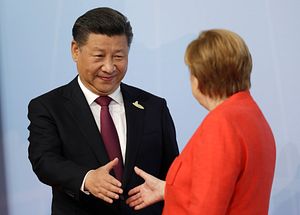In the midst of what seems to be a transformative phase for the global order, a spotlight is cast on unexpected linkages in the back rows of the concert of nations. As the two industrial powerhouses of their respective continents, Asia and Europe, China and Germany are increasingly seen as likely contenders for an informal alliance on the global stage.
As U.S. President Donald Trump seems disinclined to provide global leadership, many expect Germany and China to fill this vacuum. Trump’s less than smooth relationships with both China and Germany have helped push the two countries even closer together. When China’s President Xi Jinping met the German Chancellor Angela Merkel in July ahead of the G-20 summit in Hamburg, Xi declared that ties between the two countries “are about to enter a new phase.”
Indeed, there are signs of greater closeness. As the previous and current hosts of the G-20, China and Germany had to work closely together on the grouping’s agenda. Sino-German relations were upgraded from a “strategic partnership in global responsibility” to a “comprehensive strategic partnership” during Xi’s official visit to Germany at the end of March 2014. At the G20 Summit in Hamburg, Merkel stated that the Sino- German relationship must expand in a “time of global insecurity.” After the United States pulled out of the 2015 Paris Agreement, there is even a virtuous element in Germany and China making common cause to slow global warming and compensate for a truant Washington.
China wants far more than mere engagement with Germany: it is looking for an embrace. “The strategic character of Chinese-German relations is steadily gaining in importance,” Xi wrote in an op-ed article in the German newspaper Die Welt. The two countries “should intensify cooperation on implementing China’s ‘One Belt, One Road’ and jointly make contributions to the security, stability and prosperity of neighboring countries.”
The neighboring regions will not necessarily see the benefit of such intensified cooperation. Germany is surely conscious of the mistrust in South and Southeast Asia toward China’s strategic intentions. Its tendency to assert claims at the expense of other countries in the region and its willingness to back those claims with military muscle have been demonstrated in the South China Sea, on its Indian frontier, and most recently along its Himalayan border with Bhutan. The failure of the Trans-Pacific Partnership free-trade agreement, which would have created a U.S.-centered free-trade bloc among Pacific Rim countries from Chile to Vietnam, eliminated one mechanism for subsuming Chinese ambitions in a larger partnership.
But Germany has other reasons to maintain a critical distance from Beijing. Besides misgivings about human rights, German businesses’ market access in China is a cause for frustration. Although China wants German high-end industrial machinery, non-tariff barriers in the form of onerous legal requirements have stumped European companies wishing to do business in China. High levels of corruption add to the perception that trade with China doesn’t always occur on a level playing field. As a result, although Germany sold more than 76.1 billion euros worth of goods to China last year, China maintains a clear trade surplus with Germany.
What is more, Chinese desire to purchase German technology by buying German companies conveys China’s intention to divert German intellectual property to China. Germany was rightly concerned about the murky deals involving Chinese investors on the takeover of the robotics maker Kuka and the ultimately unsuccessful bid for the high-tech company Aixtron. There is now even talk about a potential “investment-plus” free trade agreement between Germany and China. But the mentioned asymmetries in trade relations as well as the stark differences in political values should give pause to those in Germany who, following China’s “panda diplomacy” this summer, are inclined to embrace Beijing. China would look to detach Germany from the rest of the EU, where its relations are considerably less warm. As the EU still opposes granting China market economy status at the WTO, Beijing understandably seems to prefer dealing with Berlin rather than Brussels. But being peeled away from the bloc Germany leads is surely not in Germany’s interest. And there is no need to fall into China’s strategic embrace as long as it remains a communist dictatorship with expansionist designs on its neighbors’ land and waters.
Still, there is a sustainable level of engagement that allows keeping China within the global fold without unconditionally giving in to its demands. In this regard, the strategic dialogues on foreign and security policy between the two countries’ foreign ministers and the high-level dialogue on financial policy between the two finance ministers and central bank heads are important new formats for coordinating policy. Tourism in both directions is on the upswing. And Germany became the first European country to conduct a joint military exercise with China, although it was aimed at building humanitarian relief and response mechanisms rather than fighting wars.
Germany should well engage with China, not least to compensate for the inattention of an increasingly truculent Trump administration. A United States detached from the world is bad enough. A China that the West pushes away, or a China that looks askance at prevailing global institutions, could be a disaster. While an embrace is unwise, so is rejection. The case is therefore clear: engage, but with your eyes open.
Shashi Tharoor is an MP and Chairman of the Parliamentary Standing Committee on External Affairs, Lok Sabha, New Delhi.
This interview was first published in THE BERLIN PULSE, Körber Foundation’s guide to German foreign policy. For German public opinion on German-Chinese relations, please visit www.theberlinpulse.org

































